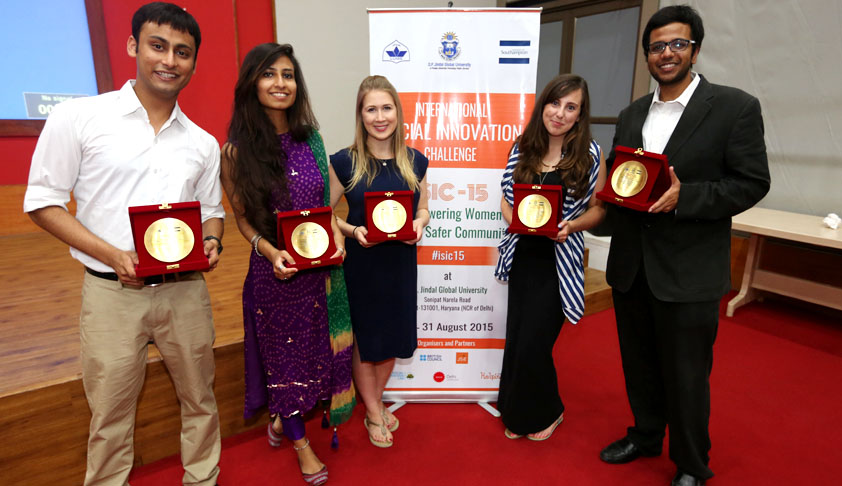India, Pakistan and UK Students Collaborate to Design Sustainable Ventures on Women Safety at the International Social Innovation Challenge
Nikita Hora
8 Sept 2015 11:50 AM IST

The Jindal Centre for Social Innovation & Entrepreneurship had hosted the the International Social Innovation Challenge (ISIC-15) at Jindal Global Law School. The Challenge was designed around the theme of ‘Empowering Women through Safer Communities.’
This first of kind “collab-etition” format consisted of students from three different universities – O.P Jindal Global University (Jindal Global Law School), The University of Southampton and the Lahore University of Management Sciences. The students navigated their cultural, ideological and disciplinary differences to come up with innovative ideas for sustainable social enterprises. After an intense competitive pitch on the last day, one of the teams emerged victorious. The winning team and their venture, ‘Sashakta’ will receive free support from a leading crowd funding platform in the UK and undergo incubation from all three partner Universities for the fruition of their social enterprise.
Prof. C. Raj Kumar, Vice Chancellor, O.P. Jindal Global University while addressing the student said that, “It is a novel idea to get the youth of three countries Indian, Pakistan and UK to work toward designing sustainable ventures on women’s safety at the International Social Innovation Challenge. Forums such as ISIC-15 allow students to discover in an experiential way, that as future global leaders they will have to find local solutions to global problems and understand local perspectives and challenges to address global issues. We at JGU have worked since inception to collaborate with over 100 institutes in 34 countries with the belief that it is this global exposure which will instill in our students global values to become global leaders of tomorrow who can think outside the box and come up with innovative solutions to pressing global issues.”
Jeremy Wade, Associate Director, Jindal Centre for Social Innovation & Entrepreneurship at O.P. Jindal Global University, said “it was inspiring to witness students from such different backgrounds come together so effectively to tackle a global social problem. As a 21st century global community, we are facing a range of complex and unprecedented problems. This experience leaves me feeling more optimistic about the potential for the next generation of leaders to tackle these problems with creative solutions.”
The format of the challenge was a carefully thought out three-fold approach – to understand, to design, and to deliver a sustainable solution to the global social challenge of empowering women through safer communities. Upon arrival the students from the three universities were divided into five international teams which then underwent 10 days of skill focused workshops to facilitate the creation of sustainable social enterprises. Workshops were conducted by the University of Southampton staff - Dr. PathikPathak, Josie Francis and Roxanne Persaud - who led students through the process of design thinking, prototyping and digital dimensions on social innovation. From the Jindal Centre for Social Innovation & Entrepreneur ship (JSiE), Jeremy Wade and RohiniSen led workshops on the business model canvas and community engagement. Rahul Nainwal, Founder of UnLtd Delhi (a partner organization), delivered workshops on the theory of change and the ideation process. Another primary partner for this event, British Council India, organized a roundtable discussion with experts in areas of women empowerment followed by female-driven cab rides across Delhi to meet the management team at the social enterprise, Sakha Consulting Wings Pvt. Ltd.
Zoya Asad, student from Lahore University of Management Sciences said that, “What I discovered is that the hostility between Indians and Pakistanis is based on perceptions based on stereotypes and generalizations. This experience allowed us to break these stereotypes. We all got along amazingly.”
Alex Dawson, a recent graduate of the University of Southampton who said: “The highlight of the programme for me was watching the Indian and Pakistani students working together.”
The organizers of ISIC-15 see this model of global collaboration, skill- based training, and local community engagement as key to equipping students with tools required to tackle 21st century challenges.


